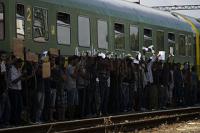-
El Paso doesn't want ID as "sanctuary city"
An El Paso-based immigrant rights group could see its hopes for a municipal ID card dashed after leaders there determined that issuing the card might prompt immigration hardliners to label the town a “sanctuary city.”
-
-
State-level immigration policies should be subject of cost-benefit analysis
While immigration policy has been the purview of the U.S. federal government, nearly all states have taken a more-active role on the issue of unauthorized immigration in the past fifteen years through actions such as making drivers licenses available regardless of immigration status and requiring employers to verify eligibility to work, according to a new study. States, however, rarely examine the costs and benefits of such policies before enacting them, suggesting the need for a comprehensive tool to help state policymakers assess the full range of costs and benefits of immigration policies before they are adopted.
-
-
Texas to re-classify immigrant detention centers as child-care facilities
In 2015 a judge ordered Texas to shut down two immigration detention centers – but in order to escape implementing the judge’s order, Texas is considering re-classifying the two detention centers as “child-care facilities.” The Texas Department of Family and Protective Services had to address a July 2015 decision from federal Judge Dolly Gee. Gee ruled that the country’s three family detention centers (a third facility is in the process of being shut down) were holding children in “deplorable conditions” that “failed to meet even the minimal standard” for a safe and clean environment for children.
-
-
U.K.'s citizenship tests act as barriers to naturalization
Citizenship tests are requiring immigrants to become “super-citizens” and act as barriers to naturalization, according to new research. In the first academic article to consider the experience of people taking the tests, researchers found that they provided immigrants with little useful or practical knowledge and were considered disparaging by requiring them to know things that citizens-by-birth would not.
-
-
U.S. undocumented population declines
In a just-released report, the Center for Migration Studies of New York (CMS) finds that the U.S. undocumented population has fallen below eleven million for the first time since 2004. The report also offers evidence that the Mexican-born undocumented population continues to decline, falling by more than 600,000 since 2010. The study further describes trends in the undocumented population over the past few years for selected countries of origin and states of residence.
-
-
France’s emergency anti-terrorism laws; Russian air strikes’ toll; DHS deportation campaign
The French government plans to propose constitutional amendments aiming to shield state-of-emergency measures from legal challenges; Russian air strikes in Syria, which began 30 September. The Russian strikes have killed 2,132 people, a third of them civilians; DHS is set to launch a campaign to deport illegal immigrant families who arrived in the United States since the beginning of 2014.
-
-
Texas sues to block resettlement of Syrian refugees

The Texas Health and Human Services Commission on Wednesday filed suits in federal court against the U.S. State Department, the International Rescue Committee (IRC), and other organizations as part of the state effort to block the resettlement of Syrian refugees in Texas.
-
-
Administration asks Supreme Court to uphold president’s executive action on immigration
One year ago, the administration announced a sweeping initiative to protect some five million undocumented immigrants from deportation for three years and grant them work permits. A coalition of twenty-six Republican-led states challenged the executive action, and earlier this month the challenge was upheld by the Fifth Circuit Court of Appeals. On Friday, the Obama administration formally asked the Supreme Court to uphold the president’s executive action. In a televised address to the nation, the president said: “We are and always will be a nation of immigrants.”
-
-
House votes for an effective ban on Syrian refugees coming to U.S.
The House of Representatives on Thursday overwhelmingly approved a bill which slows down, if not blocks altogether, the resettlement in United States of refugees from Syria and Iraq. Breaking with their president, dozens of Democrats joined all the Republicans present to pass a bill which requires the directors of the FBI and national intelligence personally to approve the acceptance into the United States of each refugee.
-
-
CBP detains 8 Syrians trying to cross Texas border illegally
Eight Syrians have been detained by U.S. Customs and Border Patrol (CBP) agents as they tried to enter the United States from Texas in the Laredo Sector. DHS issued a statement confirming that two Syrian families were taken into custody Tuesday, but clarified that they families were not trying to “sneak in.” A Syrian did attempt to enter the United States illegally through Texas in late September. The Syrian was found to be using a passport that belonged to someone else, and U.S. authorities decided against prosecuting anyone involved owing to “circumstances.”
-
-
Growing number of states say they would not accept Syrian refugees

A growing number of states have said they would not accept Syrian refugees because of security worries in the wake of the terrorist attacks in Paris. So far, the governors of seventeen states have announced they would refuse to allow Syrian refugees to settle in their states: Alabama, Arizona, Arkansas, Florida, Georgia, Illinois, Indiana, Iowa, Louisiana, Massachusetts, Michigan, Mississippi, New Hampshire, North Carolina, Ohio, Texas, and Wisconsin.
-
-
2015 refugee-related costs for Germany estimated at 21.1 billion euros
The Berlin-based Ifo Institute, a German center for economic studies, has increased its estimates of German government expenditure on refugees. The Ifo Institute now expects the costs to amount to 21.1 billion euros for 2015 alone, based on the assumption that 1.1 million refugees will arrive in Germany by the end of the year. The Institute previously estimated the costs for the state at 10 billion euros for the first twelve months, just to cover accommodation and food for 800,000 people.
-
-
Court again blocks implementation of Obama's executive order on immigration
The Obama administration’s November 2014 executive action to protect millions of undocumented immigrants from deportation has suffered a legal setback yesterday. The fifth U.S. circuit court of appeals in New Orleans, in a 2-1 decision, has upheld a May 2015 injunction which blocked the implementation of the Obama administration’s deferred-deportation plan. Legal analysts said the decision was not unexpected, as the court of appeals’ decision came several months after the same court had denied an emergency stay request from the Justice Department. The issue is now likely to go to the Supreme Court. The appeals court said in its ruling that it was denying the government’s appeal to stay the May injunction “after determining that the appeal was unlikely to succeed on its merits.”
-
-
Finnish security services: Increase in number of asylum seekers raised terrorism threat
The Finnish Security Intelligence Service (FSIS) on Tuesday said that the rise in the number of asylum seekers had increased the threat of terrorism in Finland. Finland uses a national terrorism warning system, and the FSIS yesterday raised the warning level from “very low” to “low.” Finland expects 30,000-35,000 asylum seekers to arrive this year, compared with 3,600 in 2014.
-
-
EU member states go slow on relocating refugees
In September the EU agreed to transfer 160,000 refugees over the next two years from the most affected states, such as Italy and Greece, to permanent locations elsewhere in Europe, but EU member states have so far relocated only 116 refugees and only 1,418 places have been readied by fourteen EU member states. About 770,000 asylum applications were filed in all EU member states in the first nine months of 2015, compared to 625,920 in 2014 and 431,090 in 2013.
-
- All
- Regional
- Water
- Biometrics
- Borders/Immig
- Business
- Cybersecurity
- Detection
- Disasters
- Government
- Infrastructure
- International
- Public health
- Public Safety
- Communication interoperabillity
- Emergency services
- Emergency medical services
- Fire
- First response
- IEDs
- Law Enforcement
- Law Enforcement Technology
- Military technology
- Nonlethal weapons
- Nuclear weapons
- Personal protection equipment
- Police
- Notification /alert systems
- Situational awareness
- Weapons systems
- Sci-Tech
- Sector Reports
- Surveillance
- Transportation
Advertising & Marketing: advertise@newswirepubs.com
Editorial: editor@newswirepubs.com
General: info@newswirepubs.com
2010-2011 © News Wire Publications, LLC News Wire Publications, LLC
220 Old Country Road | Suite 200 | Mineola | New York | 11501
Permissions and Policies
Editorial: editor@newswirepubs.com
General: info@newswirepubs.com
2010-2011 © News Wire Publications, LLC News Wire Publications, LLC
220 Old Country Road | Suite 200 | Mineola | New York | 11501
Permissions and Policies
